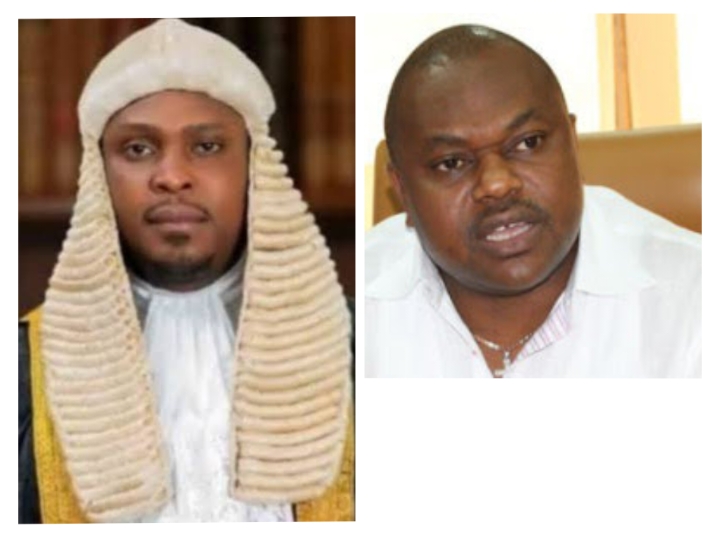Edison Ehie, Momoh Jimoh… 5 state house of assembly speakers who resigned from office

Amidst a gripping political crisis, the recent resignation of the Speaker of the State House of Assembly in Nigeria has sent shockwaves through the corridors of power.
In this story Crispng.com delves into the underlying trends behind this unprecedented move, shedding light on the intricate dynamics shaping the political landscape.
Here is the narrative of five State House of Assembly Speakers who resigned from their position in the history of Nigeria’s politics.
2014 Victor Ochie, Delta State
Engineer Victor Ochie, a prominent figure hailing from Onicha Olona in Delta State, resigned as the Speaker of the Delta State House of Assembly.
The announcement came during a session presided over by Deputy Speaker Mr. Basil Ganana in 2014.
Engr Ochie, who initially entered the State House of Assembly in 2003, had risen through the ranks, securing re-election twice and serving as the Deputy Minority Leader.
His resignation marked the end of an era, as the assembly unanimously accepted the decision. The newly appointed Speaker, Mr. Peter Owusanyan, now steps into this crucial role, steering the legislative course for the state.
This change signifies a pivotal moment in Delta State’s political landscape, with implications for governance and representation.
2019, Peter Abel Diah Taraba State
Amidst weeks of political upheaval, Peter Abel Diah, the embattled Speaker of the Taraba State House of Assembly, tendered his resignation, concluding a turbulent chapter in the state’s politics.
Representing Mbamga constituency for an unprecedented fifth term, Mr. Diah was the longest-serving legislator in the assembly. His departure, announced in Jalingo in 2019, cited personal reasons for the decision.
The political landscape had witnessed tensions between Mr. Diah and Governor Darius Ishaku, with the former controlling 13 members against the governor’s 11.
Sources suggested that lobbying efforts were at play in the backdrop, and Mr. Diah faced challenges following the removal of the Deputy Speaker, Mohammed Gwampo. The unfolding dynamics in Taraba State mark a critical juncture in its political narrative.
2016, Momoh Jimoh Kogi State
In 2016 the Kogi State House of Assembly Speaker Momoh Jimoh announced his resignation, marking a turning point. Deputy Speaker Ali Akuh, reading the letter on the House floor, commended Jimoh’s decision as being in the state’s best interest.
Umar Imam emerged as the successor amidst a factional split within the assembly since February, fueled by political strife. Five lawmakers, reportedly backed by Governor Yahaya Bello, had purportedly impeached Jimoh, citing issues of inclusivity.
READ ALSO: Rotimi Akeredolu, Shehu Kangiwa… 4 Nigerian state governors who died while in office
Legal battles ensued, with the court nullifying the impeachment, but the governor continued recognizing the faction. Federal intervention, led by the House of Representatives, declared the Kogi State Assembly incapable of legislative functions, instructing the Inspector-General of Police to seal the assembly premises.
Jimoh’s resignation encapsulates a saga of political turmoil and institutional challenges in Kogi’s legislative landscape.
2023, Moses Sule of Plateau State
Moses Sule, the then Speaker of the Plateau State House of Assembly, resigned in November 2023, citing sacrifice and a desire for state progress. Gabriel Dewan, the 30-year-old Young Progressives Party member, succeeded him.
Dewan, elected during a Tuesday plenary, emphasized unity among members and urged citizens to transcend political, religious, and ethnic divides. Expressing gratitude for his election, he underscored the responsibility with sincerity and honesty.
Plateau residents were encouraged to prioritize unity over political affiliations during this critical period. Sule’s departure and Dewan’s ascent reflect a dynamic shift in the state’s legislative leadership, signaling a commitment to stability and progress.
2024, Edison Ehie, Rivers State
Recently, Edison Ehie, the factional Speaker of the Rivers State House of Assembly, resigned from both his position and membership of the House.
Dated December 29, 2023, Ehie’s resignation letter, addressed to INEC Chairman Mahmood Yakubu, outlined his voluntary decision. This move followed political turmoil in the state, eventually drawing the intervention of President Bola Tinubu.
READ ALSO: What to know about Ehie Edison, Rivers speaker who resigned amid political crisis
Resolutions were reached and signed by the involved parties, but the intervention faced criticism from state elders, emphasizing the court’s authority. Ehie expressed gratitude to colleagues and constituents in Ahoada-East Constituency II, acknowledging the rare opportunity to serve.
His departure adds another layer to the complex political dynamics in Rivers State, leaving questions about the aftermath of President Tinubu’s involvement and the implications for the Assembly’s future.

